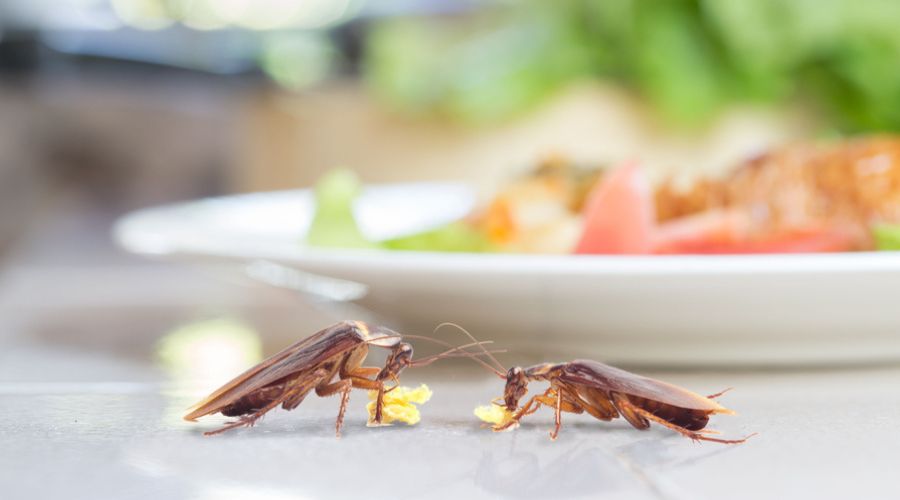Food safety is a primary concern within the context of the food industry. Effective, professional pest control is integral to maintaining high standards of food safety.
A single pest can be a vehicle for harmful bacterial contamination, causing foodborne illness.
Therefore, effective pest management is a cornerstone of a successful food safety program. This is best achieved with pest control experts like Romney Pest Control, who are committed to protecting your brand. The importance of pest control in the Texas food industry cannot be understated.
Regardless of the size of the facility, pest control can pose a significant challenge. Even minor infestation can cause significant problems and should be addressed with prevention methods or integrated pest management (IPM) solutions.
Romney Pest Control has provided commercial and residential pest control services in Texas for over 10 years, delivering the highest quality pest control service available in Dallas-Fort Worth, Austin, San Antonio, and Houston, TX.
Our team of experienced, highly-trained professionals use top-of-the-line treatments.
To better understand the importance of pest control in the food industry, let’s delve into the threats various pests can pose – and the measures you can take for effective pest control and prevention.
Common Pests in the Food Industry
Depending on food type, production facility, external environment, and geographical location, pests can vary widely. Impacted facilities include warehouses or buildings used for food handling, processing, and manufacturing.
Proper identification is essential for determining relevant treatment methods for effective pest control. Some of the most common pests found in the food industry internationally and locally are:
Cockroaches: Cockroaches are renowned for their resilience and adaptability. They carry numerous harmful pathogens and are a significant health concern.
Rodents: Rodents spread diseases and cause considerable structural damage. Their gnawing habits can destroy electrical wiring, packaging, and even contaminate food stocks. They are the biggest liability out of common pests we see – their droppings and urine are unsafe and often contaminated.
Flies: Flies are notorious vectors of bacteria. They can quickly multiply and contaminate food products and workstations. They’re difficult to get rid of.
Birds: Birds can cause a variety of problems, from physical damage to buildings and equipment to spreading diseases and causing food contamination.
Why Pest Control Is Crucial for the Food Industry?
Pests threaten the safety of food production – making effective pest control necessary. These threats include:
- Spreading diseases through the transfer of pathogens
- Bacterial contamination of surfaces, whereby the pests act as a vector
- Property and equipment damage
- Contamination of food products
- Bad reputation and resulting loss of customers
- Legal consequences, including prosecution and closure
Prompt and effective pest control services are vital to prevent these threats and ensure the safety and quality of food products.
What is Integrated Pest Management (IPM)?
Integrated Pest Management (IPM) is a holistic, science-based approach to managing pests.
Rather than simply eliminating pests, it aims to address the root cause(s) of infestation and focus on long-term prevention. The central tenet of IPM is to create an environment unsuitable for pests, using environmentally friendly methods wherever possible.
The key components of an IPM strategy include:
- Biological Control: This involves using natural predators to keep targeted pest populations in check.
- Chemical Control: If necessary, carefully selected and measured amounts of pesticides are used to protect the health of humans and non-target species.
- Mechanical and Physical Controls: These measures make a site unsuitable for pests or directly eliminate them.
- Cultural Controls: In agricultural businesses, this may involve changes in farming practices, such as crop rotation or adjustments to irrigation levels, to create conditions unfavorable for pests.
While IPM is crucial for pest elimination and prevention, additional hygiene measures covering hand hygiene, surface hygiene, air purification, and disinfection after pest infestations are also critical. These measures ensure that your properties, staff, and vehicles are safe.
The Bottomline
Romney Pest Control is committed to providing effective commercial and residential pest control service. We’re here to protect your business from the damaging effects of pests.
Our experts will guide you through our innovative products and practices, demonstrating the best way to safeguard your business. Don’t let pests disrupt your financial success. Experience a pest-free business with Romney Pest Control.
With our top-of-the-line treatment and a team of experienced, highly-trained professionals, you can trust us to provide prompt and effective pest control services.
Contact us today for an inspection or to discuss IPM as a viable option for your food processing and handling facility!




